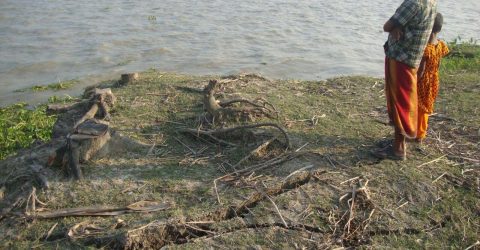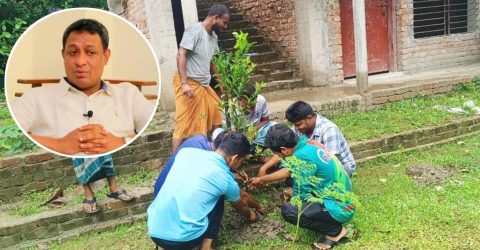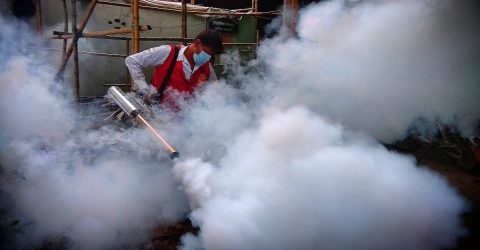Children and adolescents are the worst victims of climate change
The Bangladesh The Bangladesh
Today

Pinky Akter
Rubina Akhtar living in Shyam Nagar is not yet 14 years old. This girl from the coastal region is a victim of child marriage and is now a mother of two children. Why did Rubina’s family arrange her marriage at such a young age? Rubina’s mother said that for a long time her daughter used to have various problems including pain in the lower abdomen due to menstruation. She has consulted the doctor several times about this problem. The doctor said that Rubina’s problem is mainly due to saline water. And so Rubina’s family decided to get her married early so that reproductive health would not cause a problem.
Rubina’s mother says that this problem will be solved if she gets married and has children, so she gave her daughter in marriage.Like Rubina, many other girls below 18 years of age are being subjected to child marriage due to salt water in this village.
After having discussion with them, it is known that they are suffering from various physical problems including itching in the uterus, severe stomach pain during menstruation, hair loss and various skin diseases are also appearing on the skin. Coastal areas are one of the most affected areas by climate change. In the coastal district, child marriage is pervasive in a few villages including Satkhira proper, Shyamnagar and Kaikhali.
According to the information from the Shyamnagar Upazila Secondary Education Officer’s office, a total of 1,214 girl students found married in 89 educational institutions in Upazila. Among them, 703 are from secondary and lower secondary level educational institutions, 511 are from various madrasas and 333 are from various colleges. But locals say the actual number is higher.
Observations have shown that the intensity of uterine diseases among adolescents is higher in villages prone to brackish water. Bilkis, a 16 years old resident of Shyamnagar was saying that her lower abdomen is very painful, it seems that something is tearing from the inside of the stomach and coming down. Also there is white discharge and itching as well as frequent urination. And sometimes, it is very difficult to urinate.
Analyzing the data of Upazila Health Complex of Shyamnagar, it can be seen that along with women, teenagers are also resorting to various problems with their uterus.
Doctors say that if they suffer from uterine problems for a long time, it also increases the risk of cancer. And because of these fears, the parents are quickly marrying the girls off.
According to a preliminary report of the National Hygiene Baseline Survey published in 2014, more than 80 percent of women and girls in Bangladesh use reused cloth during their periods.
Another study published in 2019 states, “Women and adolescents in southern coastal areas wash menstrual cloth in salt water and reuse it. Thus repeated washing of menstrual cloths in salty water and frequent use of such cloths puts girls at health risk. They are also sometimes responsible for skin diseases and other sexual and reproductive health problems,” said the study conducted by three Bangladeshi organizations.
Farah Kabir, Country Director of Action Aid, said that climate change is having an adverse effect on children, especially girls.
Due to food security risks, river erosion due to climate change, floods, floods, etc. the family gave the daughter of the family in marriage at a very early age. Along with this, the problem of salty water on the coast has made the problem of child marriage more acute in the lives of teenagers.
She said that family economic crisis, and food insecurity is responsible for this. But at the root of all these are the effects of climate change. Due to flooding, river erosion, the destruction of houses, the struggle for livelihood due to the adverse effects of weather in the agricultural sector, or the closure of educational institutions for a long time due to disasters, the family wants to get the girl child of the family married off quickly.
Along with strict enforcement of laws to prevent child marriage, the government must take steps to address the climate. Farah Kabir said that if the economic support of the family is ensured, child marriage will be reduced a lot by launching the climate package to help the affected families.
Bangladesh ranks 15th out of 163 countries on the child climate risk list in the UNICEF study. One in three children, or about 20 million children, are exposed to extreme weather, flooding, river erosion, sea level rise, and other environmental shocks driven by climate change. In this context, Mr. Sheldon Yate, UNICEF is a representative in Bangladesh said that the children of Bangladesh are on the front lines of the climate crisis. They are victims of child marriage in various ways. By doing this they are subjected to more violence.
Professor and founding director of the Institute of Disaster Management and Vulnerability Studies of Dhaka University Mahbuba Nasreen said that women and children are the most affected by climate change disasters. All forms of violence against girls and children, and child marriage increased. And measures should be taken to protect children and teenagers to deal with climate change. In addition, campaigns are needed to increase awareness.
The picture of child marriage that has emerged in the research of various government and private NGOs in the country is an ominous signal.
Rifat Bin Sattar, Sector Director of Program Development and Quality at Save the Children, said the picture of child marriage has not changed much. That is why there is a need for economic support and social security from the government to deal with the climate problem.
Environmentalist Syeda Rizwana Hasan said, “Climate funds are not being spent with transparency. Many ministries and many projects are taking funds by showing the climate. This money is not being spent properly where it is supposed to go. Even those who are funding climate change may not have the experience to do that kind of work.” She said that by increasing the government’s monitoring in this regard, the climate change trust fund should be used properly to protect the future generation, including stopping child marriage.




